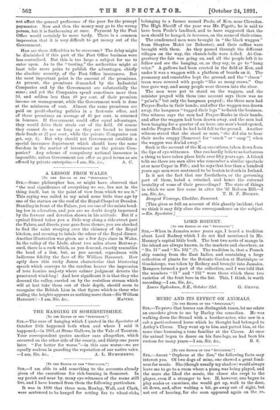[To THE EDITOR OF THE "SPECTATOR. "]
SIR,—I am able to add something to the accounts already given of the executions for rick-burning in Somerset. In my parish and near by, many eye-witnesses of the scene still live, and I have learned from them the following particulars.
It was in 1830 that three men, Rowley, Wall, and Clark, were sentenced to be hanged for setting fire to wheat-ricks
belonging to a farmer named Poole, of Ken, near Clevedon.. The High Sheriff of the year was Mr. Pigott; he is said to have been Poole's landlord, and to have suggested that the men should be hanged, in terrorem, on the scene of their crime.
The condemned men were brought in "the black waggon" from Shepton Malet (or IlcheF3ter), and their coffins were brought with them. As they passed through the different villages on the way, the church-bells were tolled. At Con- gresbury the fair was going on, and all the people left it to follow and see the hanging, or, as they say, to go to "hang; veiar." A gallows had been erected in the field at Ken, and under it was a waggon with a platform of boards on it. The- yeomanry and constables kept the ground, and the " elmen ' trees were covered with people " like so many crows." One tree gave way, and many people were thrown into the river.
The men were put to stand on the waggon, and the- minister prayed with them (one account says there was. no " pa'as'n," but only the hangman prayed) ; the three men had Prayer-Books in their hands; and after the waggon was drawn away, the hangman "tugged their legs " to finish the business.. One witness says the men had Prayer-Books in their hands,. and after the waggon had been drawn away, and the men had been hanging for a quarter of an hour, one man's hand opened, and the Prayer-Book he had held fell to the ground. Another witness stated that she stood so near, " she did zim to hear their necks crappy [Somerset for " crack " or " snap "] when, the waggon was dra'ad away."
Such is the account of the Ken executions, taken down from the lips of eye-witnesses. One can hardly believe so barbarous. a thing to have taken place little over fifty years ago. A friend tells me there are men alive who remember a similar spectacle- at or near Cupar in Fife; and he says that less than a hundred years ago men were sentenced to be beaten to death in Ireland.
Is it not the fact that our forefathers, or the governing. part of them, hated a criminal, and hence the external brutality of some of their proceedings? The state of things- in which we now live came in after the '32 Reform Bill.—I am, Sir, &c., T. H. F. HICRES. Draycot Vicarage, Cheddar, Somerset.
[This gives so full an account of this ghastly incident, that we think it may fitly close the correspondence on the subject. —ED. Spectator.]


































 Previous page
Previous page